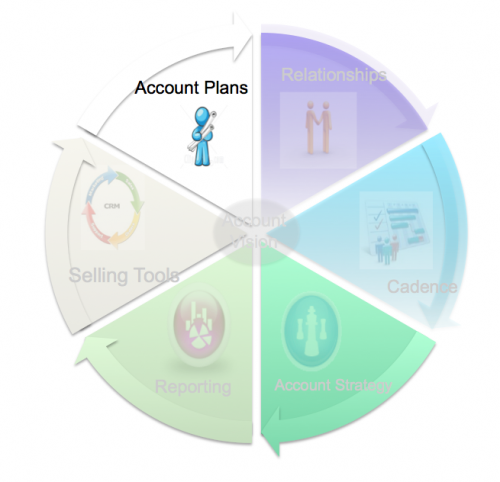This is part 3 of a 8 part series on account governance.
If the account vision is the compass of account management, then account plans are the ship. Account plans are where the execution happens. It’s the engine to successful account management.
I’ve talked about the importance of account plans before. The post is pretty complete, so I won’t go too far into how to build a good plan here. But, I do think they are critical to a good governance plan.
Account plans must have a few things to be of value. They must have goals and objectives. It’s critical to know how you are going to measure success. They need to have a robust account assessment, including what is happening in the industry, the customers financial environment, the political landscape, the clients market positioning, major initiatives, the culture, their buying habits, the key players etc. A full fledge, relevant assessment is key. A good account plan should include an organizational assessment, outlining the team responsible for managing the account. It should include the resources, their ability to execute, the relationships, strengths, weaknesses etc. A good team assessment can determine how well the team is positioned to execute on the plan. The plan also needs to outline the key opportunities at the account. Where do you have the greatest opportunity for success? A good account plan also needs to include your approach. The approach is where the rubber hits the road. It outlines exactly what you’re going to do and why. In addition, an account plan needs to include the risks to meeting your goals, a contingency plan should something change and a resource section outlining what you need, that you currently dont have, to be successful.
Once all this has been written down into a cohesive, compelling plan for the year, do it again for the first quarter. It’s critical that your plan for the year be broken down into quarterly chunks.
I can’t emphasize enough the importance of a well crafted plan.
Finally, and in my opinion the most important component of the sales plan is plan accountability. At the end of each quarter, it is imperative to review the quarterly goals in these terms; what did you say you were going to do? Did you do it? What went wrong? What went right? What do you need to change? What are your quarterly goals for the next quarter. By managing to outcomes, you keep the plan relevant. The plans become working plans, not dusty books on a shelf. I can’t emphasize enough the importance of getting this part right. A good plan requires management. It’s not enough to just write them down.
Plans ensure execution. They outline the delivery mechanisms to strong account governance. Get a good plan in place. Make sure it aligns to your account vision and you are well on your way.


